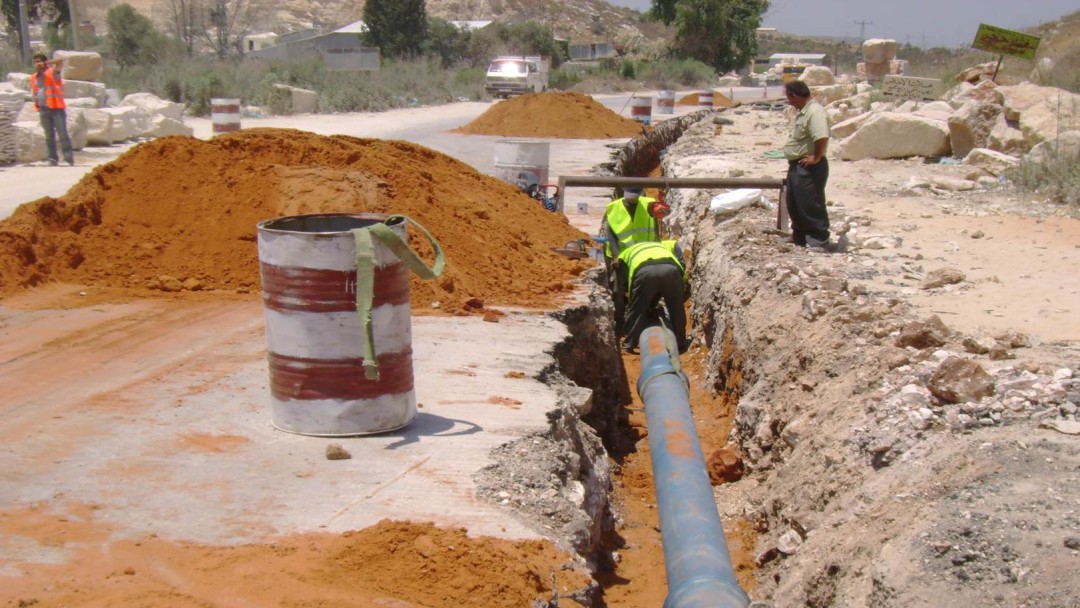News from 2017-08-30 / KfW Development Bank
Treated wastewater for olive and almond groves
KfW finances treatment of wastewater and refurbishing of water mains in Nablus

For years, on behalf of the Federal Ministry for Economic Cooperation and Development (BMZ), KfW has been promoting controlled sewage treatment for the city of Nablus in the West Bank. In addition, water losses in the city's supply system are being reduced. KfW's efforts include pilot projects that serve as models for the entire region.
The inhabitants of Nablus are not the only ones producing wastewater; businesses also create their share. Stonecutters burden the wastewater with their fine stone dust, manufacturers of sesame oil paste with salt, and dairy farms with fats. The wastewater from slaughterhouses, olive groves, and jeans factories are also problematic.
Until now, wastewater has been collected in septic tanks or other tanks and then sporadically disposed. Most of the wastewater, however, simply trickled away, endangering the groundwater.
On behalf of the EU and the German Federal Government, KfW has committed itself to help improve wastewater management and water supply in the second largest city of West Bank, investing a total of over EUR 100 million. Wastewater should no longer find its way into the groundwater. This will also have the effect of improving the quality of the drinking water. There will be fewer instances of waterborne illnesses.
"For Palestinians, water is a scarce commodity," according to Georg Grüner, the responsible project manager. "Our commitment in the areas of water supply, wastewater treatment and usage makes it possible for this valuable resource to be utilised sustainably."
A model project for the region
For this purpose, the supply and sewage lines will be expanded, along with digging a wastewater collection canal and building an additional treatment plant. One plant has been operating since 2013, and has proven to be a flagship facility. In the meantime, additional communities have been connected, a biogas power plant produces electricity from sewage sludge, and the first pomegranates have been harvested from the prototype plantation supplied with wastewater. This is groundbreaking for the Palestinian territories.
For around 100 small businesses in Nablus, other options are also being designed in order to pre-treat their wastewater so that it can then be treated in municipal plants. An environmental agency created specifically for these issues inspects the handling of the industrial wastewater.
In addition, the agricultural use of wastewater for around 20 species of plants such as olives, apricots, and pecans is tested with respect to crop yield potential, pollutant load, and irrigation technology. Farmers in the region have formed a water consumer association and plan to expand the cultivation area in the coming years.
It is expected that by 2020, more than 200,000 people in Nablus and the neighbouring villages will benefit from modern sewage treatment when an additional treatment plant financed by KfW is put into operation. This number includes 30,000 people from the refugee camps in Asker and Balata.
Reducing water losses
As a supplementary effort, KfW (also on behalf of the BMZ) facilitates the repair of Nablus' drinking water supply system. The drinking water is scarce as it is, but currently around 35 % of it is lost due to leaks in pipes and other technical failures. In the old city quarter of Nablus, located at an elevation of 400 meters in the Biblical Samaritan mountains, water supply lines can be found from the Roman, Byzantine, and British eras, presenting a serious challenge to technology.

Share page
To share the content of this page with your network, click on one of the icons below.
Note on data protection: When you share content, your personal data is transferred to the selected network.
Data protection
Alternatively, you can also copy the short link: https://www.kfw-entwicklungsbank.de/s/enzBWrMC.BpNA
Copy link Link copied